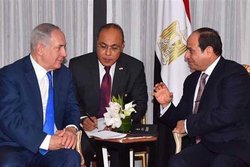 Egypt's President Abdel Fattah el-Sisi has acknowledged that his administration has maintained very deep relations with the Tel Aviv regime and is engaged in military cooperation with Israel in the restive Sinai Peninsula.
Egypt's President Abdel Fattah el-Sisi has acknowledged that his administration has maintained very deep relations with the Tel Aviv regime and is engaged in military cooperation with Israel in the restive Sinai Peninsula. RNA - Sisi made the rare acknowledgment during an interview with US television network CBS’s “60 Minutes,” which was aired on Sunday.
This comes as Egypt, under Sis’s rule, has quietly cooperated with Israel on security in the desert peninsula.
Asked whether the cooperation was the closest and deepest that he has had with Israel, Sisi responded, "That is correct. The Air Force sometimes needs to cross to the Israeli side. And that's why we have a wide range of coordination with the Israelis."
Asked why he had not managed to wipe the ongoing militancy out after receiving more than $1bn in annual US military aid, Sisi responded by pointing to the challenges that Washington has faced in Afghanistan against the Taliban.
"Why hasn't the US eliminated the terrorists in Afghanistan after 17 years and spending a trillion dollars?" Sisi asked.
Elsewhere in his remarks, Sisi, who won a second four-year term in office last year after running virtually unopposed, said that cooperation with Israel can be a sensitive and potentially damaging topic in Egypt.
Egypt's military last year denied media reports that it was cooperating with Israel in the violence-hit region of northern Sinai.
The CBS networks broadcast the interview with Sisi despite a request by the Egyptian government not to air the program.
Before the airing of the interview, CBS had said the information given by Sisi was "not the kind of news his government wanted broadcast."
"The 60 Minutes team was contacted by the Egyptian ambassador shortly after and told the interview could not be aired," the network said.
Israel has full diplomatic relations with only two Arab states, Egypt and Jordan, but reports suggest the regime is working behind the scenes to establish formal contact with Saudi Arabia and its allies.
Israeli Prime Minister Benjamin Netanyahu secretly traveled to Egypt in May last year for talks with Sisi.
A senior official of the Lebanese Hezbollah resistance movement said in November 2018 that the willingness shown by Saudi Arabia and its regional allies to establish diplomatic relations with the Tel Aviv regime has exceeded all expectations of Israeli officials, with Netanyahu saying he was not dreaming the day would come when he sees normalized ties with the Persian Gulf kingdoms.
The fact that the sheikhdoms are dramatically warming their relations with the Tel Aviv regime after secret contacts shows the policy is a decision dictated to them by Saudi Crown Prince Mohammed bin Salman, known as MbS, Deputy Chairman of Hezbollah's Executive Council Sheikh Nabil Qaouq said.
Israeli Transportation and Intelligence Minister Yisrael Katz visited Oman on November 4 last year to attend an international transport conference and pitch a railway project that would link the Persian Gulf to the Mediterranean via the Israeli-occupied territories.
The trip came on the heels of a surprise visit by Netanyahu to Oman in late October 2018, where he met Sultan Sayyid Qaboos bin Said Al Said at the Bait al-Barakah Royal Palace in the coastal city of Seeb near the capital Muscat.
Netanyahu's unpublicized visit to Oman came on the same day that Israeli Culture and Sports Minister Miri Regev traveled to the United Arab Emirates to accompany Israel’s judo team at the Abu Dhabi Grand Slam 2018.
It is evident that any progress in the Arab-Israeli relations can only happen at the expense of the Palestinians. Critics say Saudi Arabia’s flirtation with Israel would undermine global efforts to isolate Tel Aviv and harm the Palestinian cause. They also say Riyadh has gone too far in its cooperation with Tel Aviv as a way of confronting Tehran.
In a statement released in November last year, US President Donald Trump said Washington intends to remain "a steadfast partner" of Riyadh to ensure the interests of the United States, Israel and the regional allies.
Trump earlier also stressed that the stability of Saudi Arabia benefits Tel Aviv, saying “Israel would be in big trouble without Saudi Arabia."
Riyadh put further pressure on other Persian Gulf states to normalize their relations with Israel this year when it formed an alliance with Washington and Tel Aviv to protect its beleaguered crown prince in the aftermath of the murder of Saudi journalist Jamal Khashoggi at the kingdom’s consulate in Istanbul in October 2018.
847/940